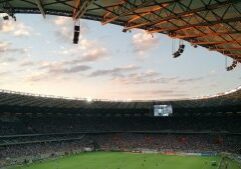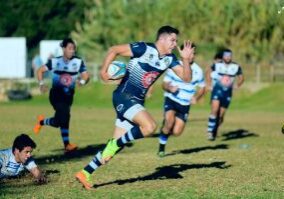This post was originally written back in April by Thunder Treats author Jack Potts. With Michael Jordan getting inducted into the Hall of Fame this past week, we thought we would bring this back to the surface….
Let’s get one thing straight before this article even gets started – Michael Jordan was the greatest basketball player I have ever seen….to date. LeBron might get there one day……or he might not. So before you post a comment about how I am just a hater, stop and re-read the first sentence of this post.
Now, let’s get started. Michael Jordan had, and by all accounts, still has a gambling problem. Not a “drop a couple thousand on a weekend in Atlantic City” problem, but a “drop a hundred thousand on a round of golf” problem. By now, most people have heard this, and I didn’t expect to blow anyone’s socks off with that statement. But what may surprise people, is that his first retirement from the NBA was not really a retirement at all. Jordan was forced out of the NBA by commissioner David Stern for his gambling problems.
Jordan’s problems began in 1992, when he was subpoenaed to testify in the criminal trial of one of his acquaintances, James Bouler. Bouler was a convicted drug dealer, and at the time of his trial was in possession of a personal check, signed by Michael Jordan, for the amount of $57,000. When first questioned, Jordan tried to explain away the check as a simple business loan. He later recounted under oath and testified that it was in fact payment for a weekend’s worth of gambling losses. This was the first time the public got a glimpse into Jordan’s long-time rumored addiction. Less than a year later, in 1993, Richard Equinas published a book titled Michael and Me: Our Gambling Addiction, My Cry for Help! In the book, Equinas claimed he had gambled and won over $900,000 from Jordan while betting against each other in rounds of golf. This was the second time within a year that Jordan’s gambling was forced into the public light. So what’s the big deal? Is it really anyone’s business how Air Jordan spends his money or his free time? Yes – it’s the NBA’s business.
Up to this point in his career, Michael Jordan had a squeaky clean image and was by far and away the world’s most marketable athlete. He was single handedly responsible for taking the NBA to new heights of popularity. In a 1998 Fortune Magazine article, Michael Jordan’s economic impact was estimated to be a staggering $10 billion. Yeah, that’s billion with a b. His impact on the NBA’s attendance alone was an estimated $165.5 million. If Jordan’s image became tarnished, he as well as the NBA stood to lose a lot of money. With the media boom of the 1990’s, an athlete’s image became more and more important. One arrest, suspension, questionable act, or even rumor could cost an athlete millions in endorsements (see also Bryant, Kobe and Phelps, Michael). Eventually, there was so much concern over Jordan’s gambling and how it would affect his image, that following the Bulls 3rd championship, the NBA announced they were launching an official investigation to see if he had violated any league rules with his gambling.
Before the investigation into Jordan’s gambling problems could be completed, Jordan announced he was retiring from basketball on October 6, 1993. Jordan’s retirement press conference would provide a couple of interesting tidbits as to the real reason to his sudden exit from the game of basketball, but you have to look closely. The first piece from the press conference to raise some eyebrows came when Jordan said “…..I have reached the pinnacle of my career..” Yes, he had won a couple of championships and plenty of awards, but did anyone believe that he was quitting the game he loved so much because there wasn’t anything left for him to accomplish. By all accounts, Jordan was the fiercest competitor the world had ever seen. To this point in his basketball career, he was not considered the greatest basketball player of all time – he was just beginning to enter the discussion. So why would he walk away at age 29, when he seemed to be just beginning his legacy? It’s very simple really. Ask yourself a couple questions. Were you surprised when Jordan announced his first retirement? If yes, why were you so surprised? Exactly.
Also during the press conference, Jordan was asked what his retirement plans were. He answered “…it’s time to be a little bit unselfish in terms of spending more time with my family…”. Ok, so maybe he wanted to spend some QT with the fam – I think everyone could respect that. But as we all know, Mike spent his first (and only) year of retirement trying to play major league baseball. What’s a better way to spend time with your family than by traveling the country playing a full season of professional baseball? And while we’re on the topic of Jordan’s baseball career, let’s talk about how bad he really was. In 102 games with the Birmingham Barons, Jordan batted just .202 with 3 HR, 52 RBIs and 114 strikeouts. Now I would argue that it’s an incredible feat in itself just to be athletic enough to even consider playing two different professional sports. And I’m all for giving credit where credit is due, but I will not buy the argument that Jordan walked away from the sport where he was the best on the planet to play a sport where he struggled to find playing time at the lowest level. And how does a below average baseball player like Jordan even get the chance to play a full season of professional baseball? Well it turns out that the Birmingham Barons were a minor league affiliate of the Chicago White Sox. And the owner of the Chicago White Sox happens to be Jerry Reinsdorf. In case you still can’t connect the dots, Jerry Reinsdorf also owned the Chicago Bulls. So theoretically, Jordan could have been cashing checks from Reinsdorf while he was retired, even though he was no longer technically employed by the Chicago Bulls.
The final and possibly most damning piece to the puzzle came from a question that was asked at Jordan’s retirement press conference. When asked by a reporter “Will you miss the sport?”, Jordan replied by saying “I’m pretty sure I’ll miss the sport. To come back is a different thought –I can’t answer that. I’m not making this a never issue. I’m just saying right now I don’t have the mental drive to come out and push myself to play with a certain focus. Five years down the line, if the urge comes back, if the Bulls will have me, if David Stern lets me back in the league, I may come back.” Read that last line again. Anything in that sentence stick out? IF Jordan really was retiring because he didn’t have the drive, was at the pinnacle of his career, wanted to spend more time with his family, or any of the many other excuses he gave for his retirement, why on earth would David Stern not let him back in the league? Jordan was making money hand over fist for Stern and the NBA. With Jordan as the face of the NBA, the game was spreading globally with no signs of slowing. Why would Stern not allow the world’s most popular athlete to come back and play basketball if Jordan was simply retiring? Wouldn’t he be welcomed back with open arms?
Three days after Jordan announced he was retiring from basketball, David Stern and the NBA
announced that the investigation into Michael Jordan’s gambling had concluded. They had found nothing to indicate that Jordan had violated any NBA rules. When pushed for more details of the investigation, the NBA admitted they never even interviewed Jordan. I would think it might have proved valuable to have asked Jordan a few questions at some point in the investigation into his gambling problems, but I digress. Another piece to consider is the timing of the conclusion of the investigation – three days after Jordan’s retirement. It strikes me as a little fishy that Jordan announces his retirement, and then the investigation is called off.
announced that the investigation into Michael Jordan’s gambling had concluded. They had found nothing to indicate that Jordan had violated any NBA rules. When pushed for more details of the investigation, the NBA admitted they never even interviewed Jordan. I would think it might have proved valuable to have asked Jordan a few questions at some point in the investigation into his gambling problems, but I digress. Another piece to consider is the timing of the conclusion of the investigation – three days after Jordan’s retirement. It strikes me as a little fishy that Jordan announces his retirement, and then the investigation is called off.
My Theory: So what does this all boil down to? Jordan was in pretty deep with his gambling addictions – no real arguments there. By the time the 1993 NBA Finals had started, his gambling could no longer be kept private. He was starting to feel the pressure of the media and his image was taking a beating. His sponsors were growing more and more concerned and the NBA’s major partners were beginning to sweat. David Stern realized he could no longer ignore the issue and had to open an investigation following the 1993 playoffs. The investigation lasted through the summer of 1993, and Stern found some things that he didn’t like. He soon realized he had a nightmare on his hands – he was going to have to suspend the world’s most popular athlete because of gambling violations. The suspension would cripple the NBA for years to come, so Stern met with Jordan and explained the situation. Jordan realized how much trouble he was in, and he could see endorsement money and his marketability slipping away. So Stern proposed that Mike leave the NBA for a year and the NBA would in turn agree to drop the investigation. Remember, the official NBA investigation into Michael Jordan was concluded only three days after he announced his retirement – the timing was suspicious to say the least. In an effort to keep the endorsement doors open and Jordan’s popularity high, Stern and Jordan met with the owner of the Bulls, Jerry Reinsdorf. He stood to lose as much as anyone in this situation and was ready to listen. With agreement from all parties, Jordan would retire from basketball and play baseball for the Jerry-Reinsdorf-owned Birmingham Barons baseball team for a season. The plan would provide Jordan with a way to keep his popularity from plummeting and it would eliminate the need for the NBA to suspend him. The NBA and Jordan both avoid career-threatening blows to their images and after a 1 year hiatus, they both return to raking in millions of dollars for each other. Reinsdorf would get to keep Jordan on the payroll and help guarantee when he did come back to play basketball that it would be for the Bulls. It all gets swept under the rug and it’s a win-win for everyone involved.
Is that really how it all went down? I’m not sure anyone will ever know, but it makes sense to me. At the very least, there are plenty of unanswered questions about Michael Jordan’s first retirement from the NBA.
Sources
Posted in Awesomeness











